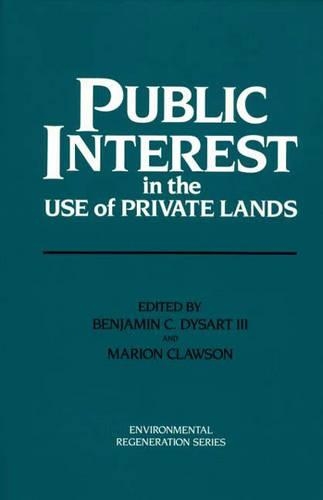
Public Interest in the Use of Private Lands
(Hardback)
Publishing Details
Public Interest in the Use of Private Lands
By (Author) Marion Clawson
Bloomsbury Publishing PLC
Praeger Publishers Inc
20th November 1989
United States
Classifications
Tertiary Education
Non Fiction
333.730973
Physical Properties
Hardback
200
Description
This third volume in the Environmental Regeneration Series, sponsored by the Rene Dubos Center, brings together original work by distinguished scholars and policy makers on the management of the nation's land resources. As the editors note at the outset, almost all questions of environmental quality or resource use ultimately focus upon the land. And, they argue, because most food and energy production, toxic waste storage, resource use, and other activities take place on privately owned land, socially responsible resource-related tradeoffs and good stewardship are at least as important for our private lands as for our public lands. In their examination of the bases for public interest and control of privately owned lands, the contributors consider the rights and obligations of the private owner, the different natural resource situations, regional variations, and the sometimes conflicting goals of different interest groups. The contributors pay particular attention to interrelationships in land use, the linkages among all the components of resource systems, and the necessity of expanding system boundary definitions beyond traditional, technically-oriented definitions. Among the specific issues addressed are maintaining agricultural productivity, siting concerns, cross-media environmental problems, and multiple use considerations. Individual chapters are devoted to such topics as effective toxics management, biotechnology, acid rain, waste management, the location of industrial facilities, and nuclear waste packaging. Taken together, these essays will provide students of land management and policy makers in local and national government with a better understanding of the complex issues involved--an understanding that should lead to better informed decision making about the responsible use of our nation's private lands.
Reviews
A collection of papers selected and edited by two preeminent researchers in the area of public land management. Each chapter reports on a research project, complete with abstracts, references, and bibliographies. Of the 11 chapters, seven address the location of facilities/activities of broad regional or national concern on lands in private ownership: waste facilities including toxic wastes, agricultural production, and nuclear waste siting. Here the focus is on the needs of the activity rather than on the needs of the landowner. Three chapters turn the equation around somewhat and concentrate on the needs of the landowner--one chapter related specifically to agricultural landowners and two others that are more general. The remaining chapter, on the effect of acid rain on corporate forest landowners bridges the two perspectives. The book is generally easy to read for moderately knowledgeable and interested individuals. . . . It would be most useful as a source of supplementary readings for advanced undergraduate courses.-Choice
"A collection of papers selected and edited by two preeminent researchers in the area of public land management. Each chapter reports on a research project, complete with abstracts, references, and bibliographies. Of the 11 chapters, seven address the location of facilities/activities of broad regional or national concern on lands in private ownership: waste facilities including toxic wastes, agricultural production, and nuclear waste siting. Here the focus is on the needs of the activity rather than on the needs of the landowner. Three chapters turn the equation around somewhat and concentrate on the needs of the landowner--one chapter related specifically to agricultural landowners and two others that are more general. The remaining chapter, on the effect of acid rain on corporate forest landowners bridges the two perspectives. The book is generally easy to read for moderately knowledgeable and interested individuals. . . . It would be most useful as a source of supplementary readings for advanced undergraduate courses."-Choice
Author Bio
BENJAMIN C. DYSART III is Professor of Environmental and Water Resources Engineering at Clemson University. MARION CLAWSON is Senior Fellow Emeritus and past Director of Land and Water Studies Programs at Resources for the Future, Washington, D.C.
